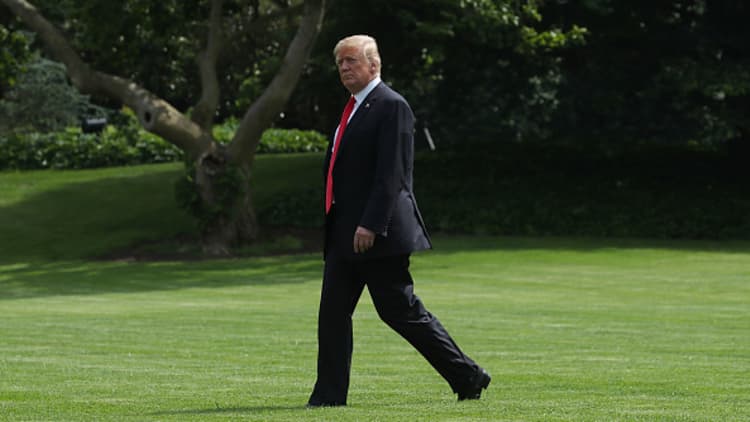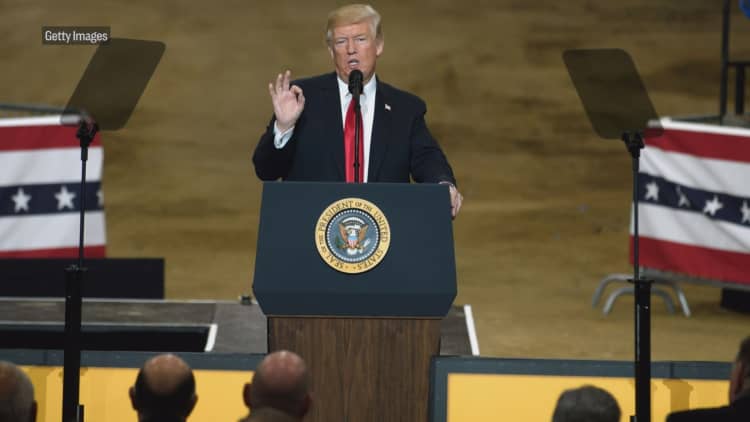President Donald Trump might be dead certain that he has the "absolute right to PARDON myself," but experts are divided.
No American president has ever tested the idea. Nor has a court has ever ruled on the question of whether such an extreme action is allowed under the U.S. Constitution.
Trump tweet.
But 44 years ago, when the Justice Department was faced with the possibility that President Richard Nixon might try to pardon himself, a top lawyer in the department in a memorandum to the deputy attorney general said the answer to that question was an unequivocal "No."
"Under the fundamental rule that no one may be a judge in his own case, the President cannot pardon himself," wrote acting assistant attorney general Mary Lawton in her Aug. 5, 1974 memo, four days before Nixon resigned in disgrace.
"If under the Twenty-Fifth Amendment the President declared that he was temporarily unable to perform the duties of the office, the Vice President would become Acting President and as such could pardon the President. Thereafter the President could either resign or resume the duties of his office," Lawton wrote.

A number of legal scholars Monday, on the heels of Trump's tweet proclaiming his power to pardon himself, agreed with Lawton.
But other leading legal experts disagreed, including some who otherwise are critics of the president.
Below, 12 experts weigh in on Trump's claim.
Jamal Greene, Dwight Professor of Law at Columbia Law School
"The Constitution grants the president power to issue pardons for federal crimes," Greene told CNBC. "It doesn't say he can't pardon himself, so there's an argument to be made, but I think the better view is that a ban on self-pardons is implicit. Giving the president the power to be a judge in his own criminal case is inconsistent with this being a rule of law society. It would enable the president theoretically to commit the worst federal crimes imaginable — terrorism, treason, etc. — with impeachment as the only remedy. Reading the Constitution to require that should be avoided if at all possible."
Jens David Ohlin, vice dean and professor at Cornell Law School
"The self-pardon would be a disastrous move for Trump," Ohlin told CNBC. "It would accelerate impeachment. Even talking about self-pardon helps galvanize the anti-Trump movement in the run-up to the midterm elections that will decide the makeup of the House and the Senate. It is hard to predict how the Supreme Court would react to a self-pardon, but certainly it would be viewed by most of the electorate as corrupt. It's the ultimate expression of Trump's vision of the president as monarch, rather than rule by co-equal branches of government as expressed by the Founding Fathers."
Richard Pildes, Sudler Family Professor of Constitutional Law at New York University School of Law
"Nothing in the Constitution or existing constitutional doctrine directly addresses the issue of a presidential self-pardon," Pildes told CNBC. "But much of constitutional law is based on reasoning from the underlying design of the Constitution and the structures it creates, and a presidential self-pardon is so radically inconsistent with the Constitution's commitments to (1) limited government; (2) the separation of powers; (3) and elected officials being accountable to the rule of law that I doubt any court would uphold the legality of a presidential self-pardon."
Margaret Love, former U.S. pardon attorney
"The answer has to be no," Love told CNBC. "In US v. Nixon, the Court basically said that Nixon as the subject of a criminal investigation did not speak for the government and therefore could not withhold the tapes from the prosecutor who did. This case teaches that the president cannot act in an official capacity to benefit himself against an authorized criminal prosecution. My first career was in medieval history and what Trump seems to be relying on is something like the ancient religious theory of kingship where the king has one corporal body that is mortal and may die, and another official body that lives on in his successors (as in "the king is dead, long live the king"). So the only way a self-pardon could work, both as a practical and theoretical matter, would be for the immortal official President to pardon the mortal Donald's crimes. I don't know how it would work otherwise - and I think it is foreclosed by US v. Nixon."
Mark Tushnet, William Nelson Cromwell Professor of Law at Harvard Law School
"The constitutional arguments about self-pardoning are ... complex, and no one should have strongly held views about the correct analysis," Tushnet told CNBC. "That said, my view is that the weight of the arguments lies in favor of finding that the president has the power to self-pardon, because of the president's power to 'take care that the laws be faithfully executed.' This gives the president a great deal of discretion about initiating and terminating investigations, coupled with the absence of express limitations on the pardon power (other than barring pardoning in cases of impeachment, which isn't, technically, a criminal proceeding). But, as almost everyone also acknowledges, exercising the power to self-pardon would almost certainly trigger sufficient public outrage to make impeachment a realistic possibility — or, put another way, exercising the power to self-pardon, if the president has it, would be extraordinarily politically unwise (ordinarily). But, again, we aren't in ordinary times, and perhaps a self-pardon wouldn't trigger that reaction in the present circumstances."
Mark Osler, Professor and Robert and Marion Short Distinguished Chair in Law at the University of St. Thomas
"He can issue himself a pardon warrant," Osler told CNBC. "There is nothing to stop him from doing so. The question is what happens next. It probably could not be challenged until a prosecutor presented a charge against him, and he then relied on the Pardon as a defense."
Richard Painter, former chief ethics lawyer to President George W. Bush
"He absolutely cannot pardon himself," Painter told CNBC. "I do not know of an instance in human history in which a king has pardoned himself. The pope does confession to another priest. A pardon is by its very nature when one person pardons another. The point is, the constitution uses the word pardon, and a pardon is by very nature a situation that involves two people, or between God and a human being. We even say 'Forgive us our trespasses,' in The Lord's Prayer."
Preet Bharara, former United States Attorney for the Southern District of New York
"I think (if) the President decided he was going to pardon himself, I think that's almost self-executing impeachment," Bharara told CNN's "State of the Union" on Sunday.
"Whether or not there is a minor legal argument that some law professor somewhere in a legal journal can make that the president can pardon, that's not what the framers could have intended. That's not what the American people, I think, would be able to stand for."
Renato Mariotti, former federal prosecutor
"You don't need to be a lawyer to understand why courts would never uphold a president's power to commit crimes and then pardon himself for them," Mariotti wrote in a post on Twitter Monday. In a separate post, he wrote: "Many legal experts call Trump's legal arguments 'novel,' but that doesn't go far enough. His arguments have never been made before because they're extreme and dangerous. They will be rejected by courts because they're consistent with tyranny, not our Constitution. "
https://twitter.com/renato_mariotti/status/1003628075387584513
Harvey Silverglate, Civil Liberties Attorney at the law firm of Zalkind Duncan & Bernstein and co-founder of the Foundation for Individual Rights in Education
"Since the question of presidential self-pardons turns on a constitutional provision – the president's pardon power – where there is no judicial precedent that answers the question, I think it is wise to simply take the text of the Constitution at face value," Silverglate told CNBC in an email. "The president is given the unequivocal power to pardon. ("[He] shall have Power to grant Reprieves and Pardons for Offenses against the United States, except in Cases of Impeachment" – Article II, Section 2.) There is no expressed limitation governing whom the president may or may not pardon. Therefore it seems quite clear to me that the President may pardon himself."
John Brennan, former director of the CIA
"The constitutional powers granted to the president for pardon are quite broad," Brennan said Monday on "MSNBC Live with Hallie Jackson." He added: "It doesn't exclude explicitly the president's pardoning of himself."
Nicholas Gravante, Jr., partner at the law firm of Boies Schiller Flexner
"I'm not sure that there's a definitive answer," Gravante told CNBC. "The notion of somebody taking office and then being able to pardon themselves for things they have done while in office would give any president the freedom to act lawlessly and then simply be allowed to pardon themselves from the consequences of such actions prior to leaving office. In effect, the president would be not subject to the rules of law. and this is a country that is governed by the rule of law."
WATCH: Trump says he has absolute right to pardon himself




